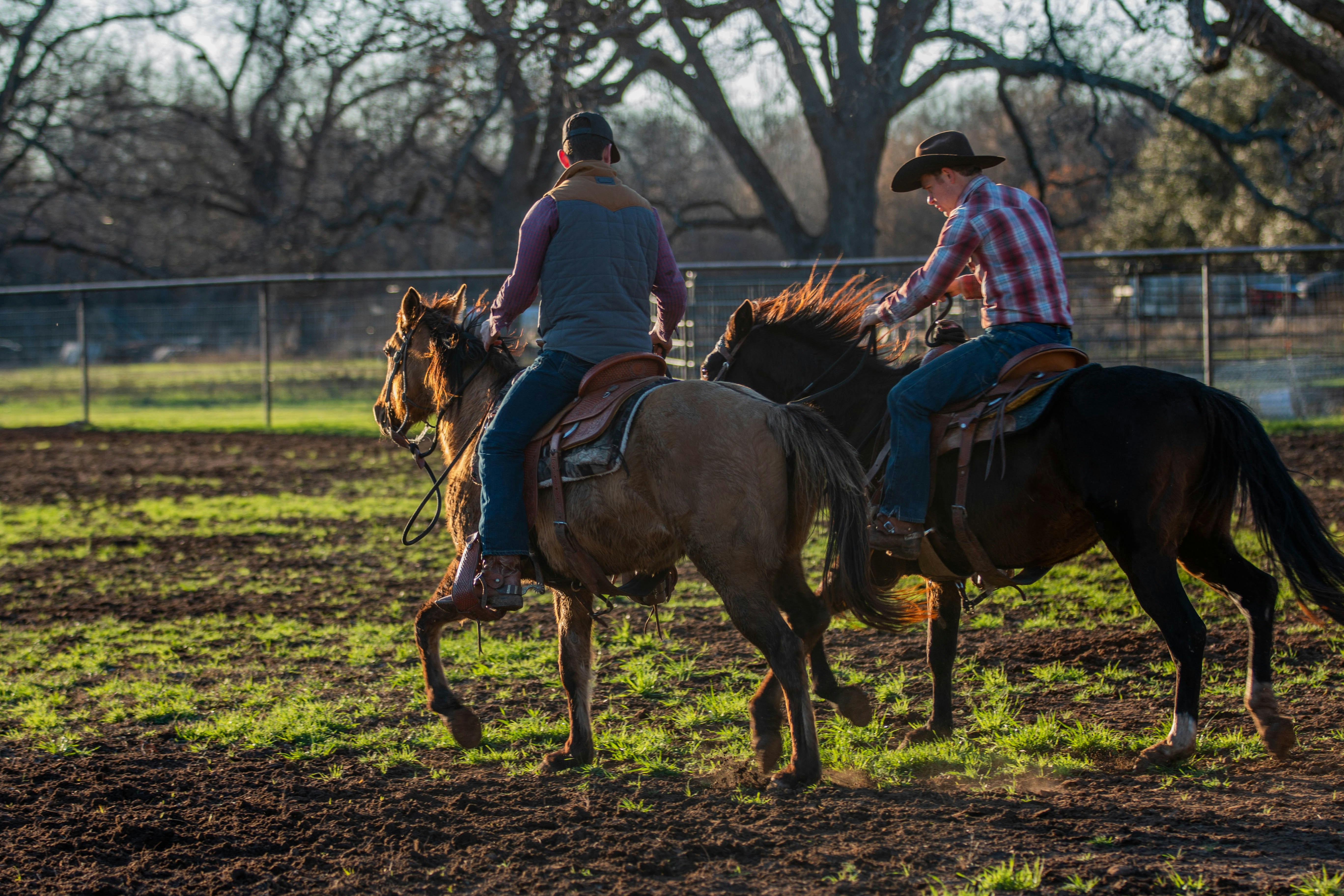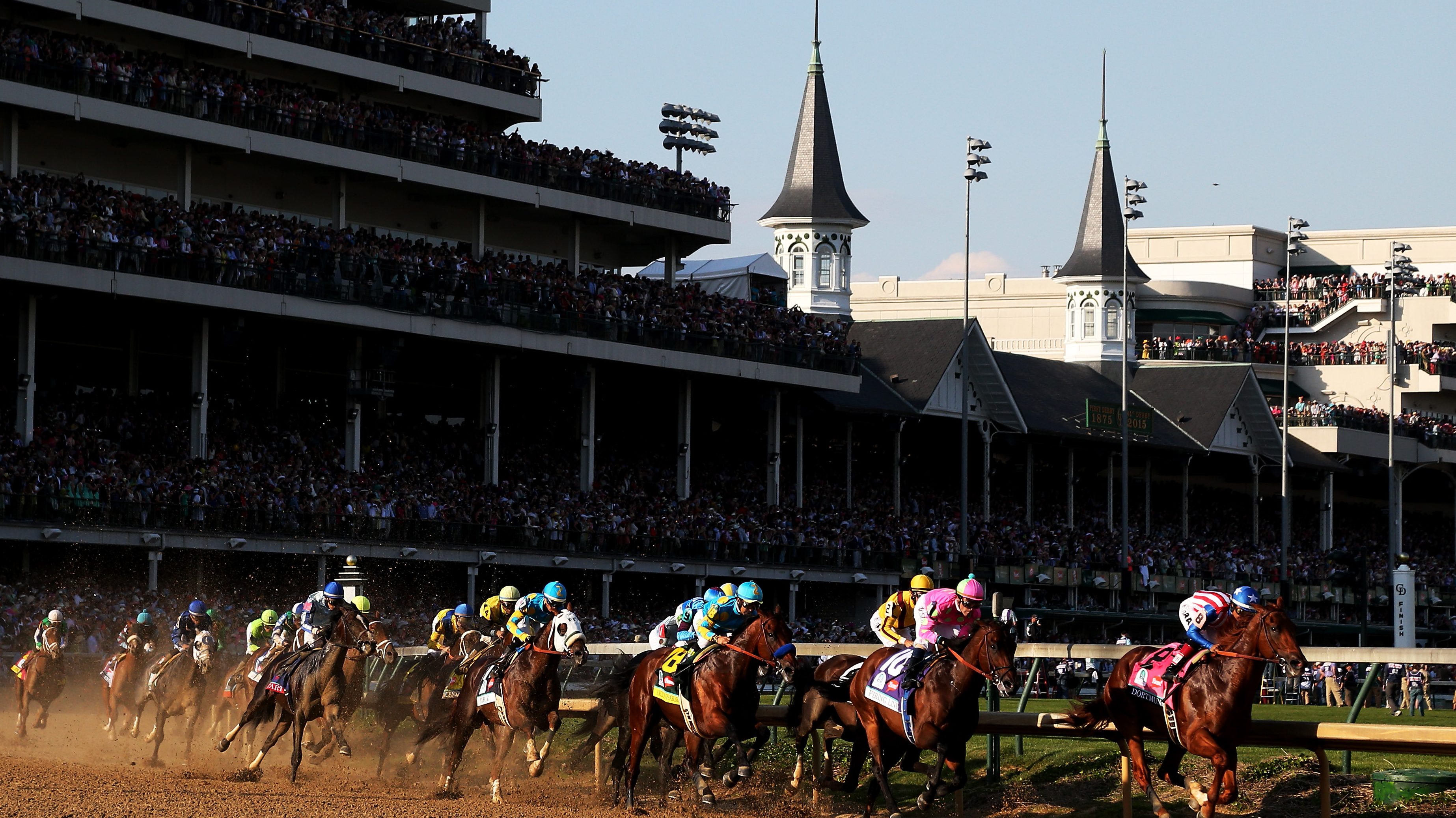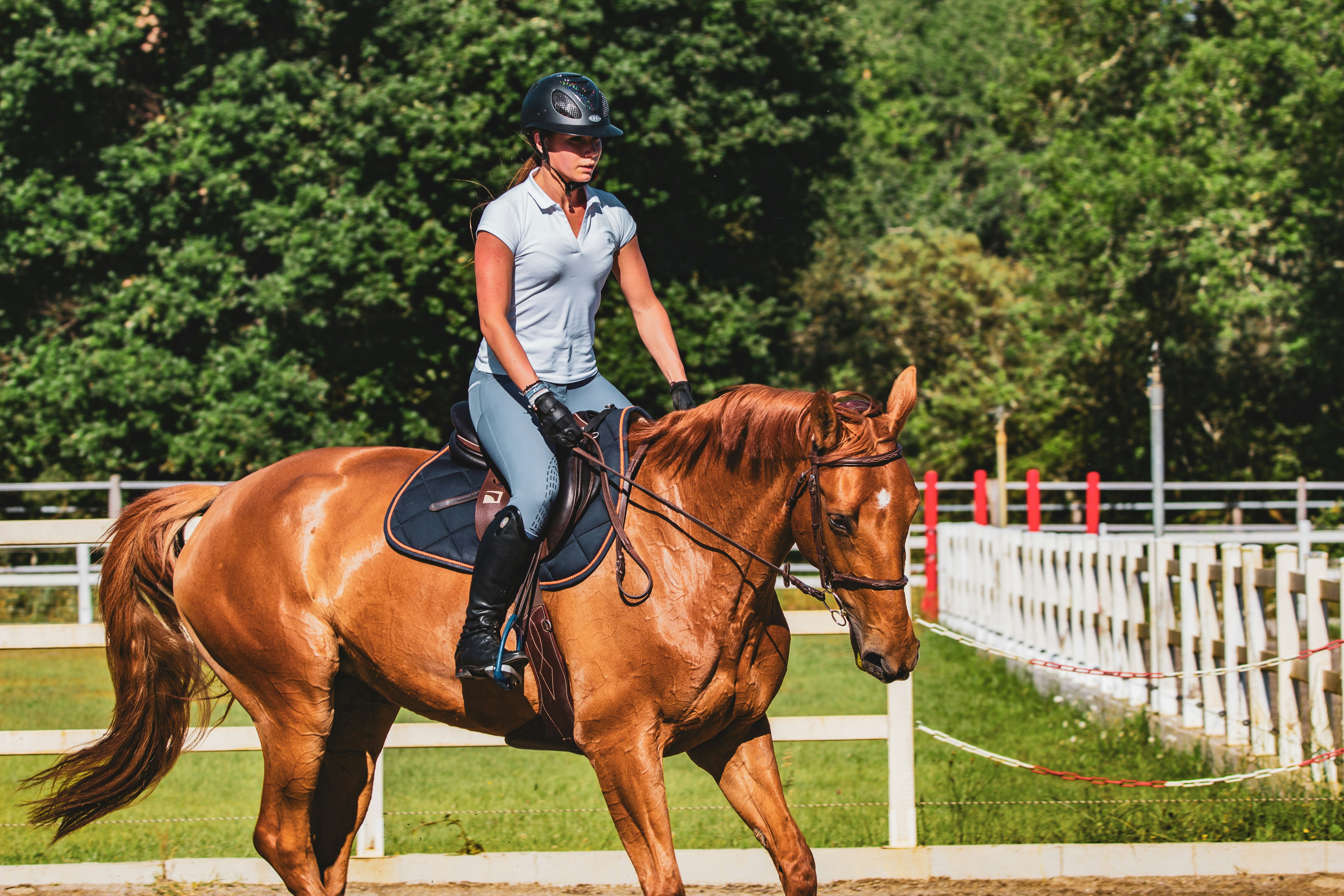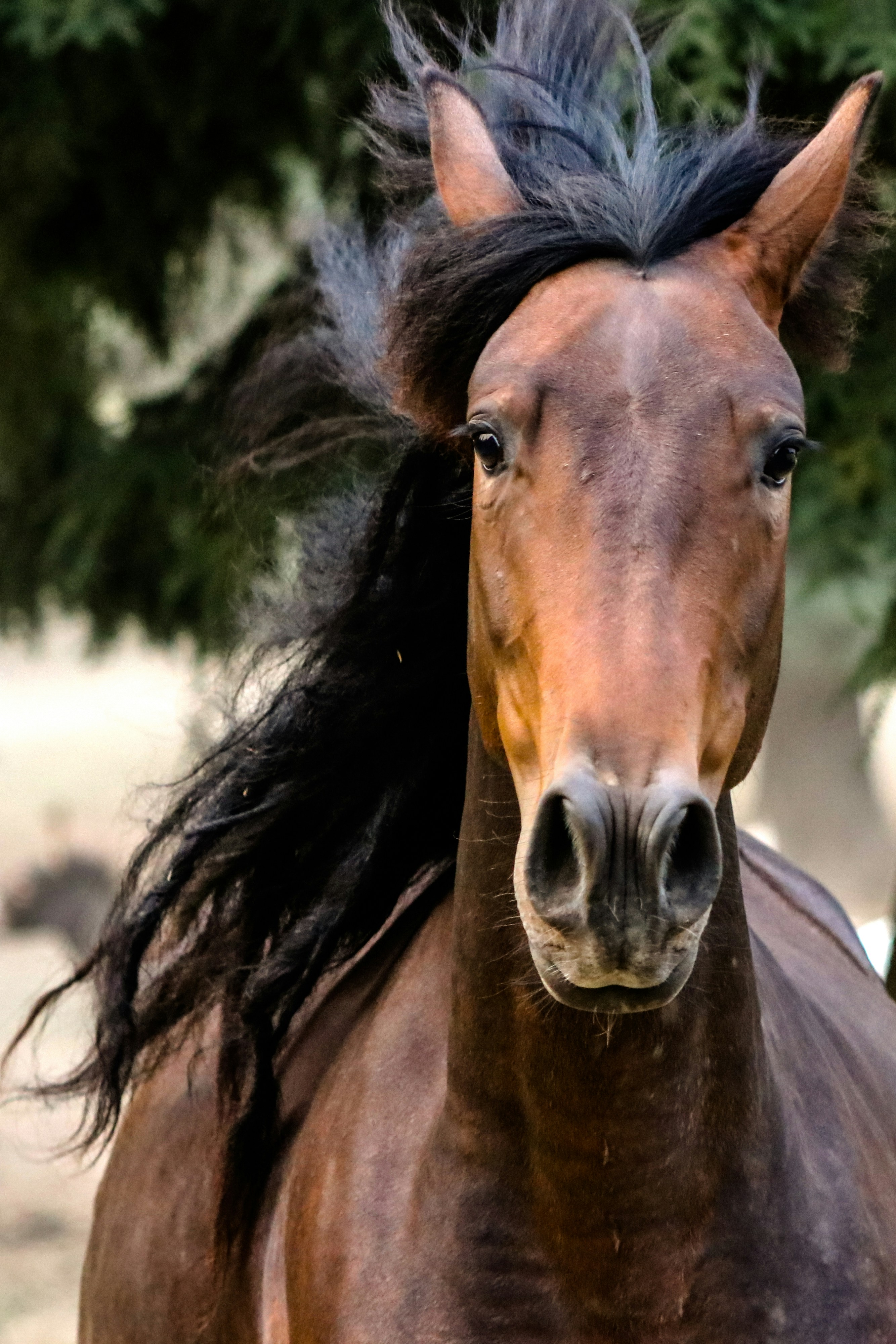How Does Betting Work in Horse Racing?
by Henry
Posted on 27-10-2020 04:56 AM

Wagering on horse racing is done through parimutuel betting. Whereas sports betting is essentially the sports book vs.

Betting on horse racing is easy enough as you are merely placing your money on the horse you think will win. There are some things you need to know though and the first of these is how to read the odds. The odds can be displayed in decimal or fractional displays and we have both of these explained below.
Are you with a group of friends betting on horses at the racetrack? a fun way to bet on horse races that gets everyone in your party involved is a group show parlay. It works like this: have each person ante up $5, and pool the money. Each person in the group picks one race and one horse to bet to show. Place the first bet, and if you win, parlay the money on the next race and horse. Your winnings can add up very quickly. For example, if four people start with $20 and each person wins a $3 show price, you’ll have $101 after only four races!.
A popular sports betting site with a funny horse racing gifts horse racing gift ideas gifts for a horse racing fan focus, especially on the live streaming side. Watch the haskell invitational live on tvg and take advantage of the generous sign-up offer. New bettors receive  get a single risk free wager up to $200 using the promo code lsrtvg. Be sure to take advantage of tvg’s free past performance data offer to find the best value picks.
Usatsi ah, the preakness stakes -- one of the most celebrated and anticipated horse racing events of the year. This year -- one flipped upside down because of the coronavirus pandemic -- is no different. Those who don't often participate in betting on the ponies may not understand all the excitement, but it's never too late to get in on the action. If you aren't exactly sure how it all works, don't you worry -- we're here to help you get up to speed. If you don't particularly understand the process or the terminology of betting (we know it can be a bit confusing), we've got you covered with a handy cheat sheet.
One of the world's most reputable bookmakers consistently offers the best prices on premier league football and also impresses when it comes to horse racing events, while high betting limits and live streaming service only add to the appeal.
Betting on horse racing and the kentucky derby is more than just win-place-show or exacta betting. And there are many ways to handicap a race beyond looking at just the past performance charts. Several angles can be useful and successful, and some angles are better than others. The trainer – is a most important aspect of racing. Through experience and trial and error, successful trainers know how to prepare and condition a horse for racing. Trainers have tendencies and styles, and you can study a trainers stats just as you would a horse.
Horse Racing Betting Explained
Horse racing is one of the oldest sports-betting genres, and also happens to be one of the most exciting and entertaining events that sports has to offer. Unfortunately, horse races tend to get lumped together, and the casual sports bettor often doesn’t know that there are many different events, and in turn, several different types of horse racing.

When picking a card from a standard deck, you have a one in fifty two chance of picking each card. The odds for each card are the same. But in horse racing betting , for example, the odds vary, depending on factors such as the horse, jockey, conditions, trainer and many other variables. That’s why bookmakers set different odds for different outcomes, based on the probability of that outcome eventuating.
Get our 2020 preakness stakes coverage including, picks and odds betting on horse racing can be very intimidating to people that don't understand how it all works and what all the numbers mean, but once you learn the basics of understanding horse racing odds it really couldn't be simpler. If anything, it may even be easier than other forms of sports betting to understand because of the transparency - you know exactly how much is being bet on each horse at any time, so you can easily spot trends and opportunities.
June 20, 2019 by editor leave a comment betting on horse racing can be very threatening for people who don’t understand how all this operates and what all of these numbers mean, but once you’ve learned the basics of horse racing chances, it couldn’t be easier. If anything, it can be even easier to understand than other forms of sports betting due to transparency.
Before placing your horse racing bets, you need to familiarise yourself with odds. We'll explain the basics below but for a comprehensive explanation you can read our ultimate guide to understanding how betting odds work. Fractions – traditionally used by bookmakers in the uk and ireland. Fractional odds quote the amount that will be paid out (on the left) should the bet win relative to the stake (on the right). For example, for odds of 5/1, for every £1 you place, you will make a profit of £5 (should the bet win) meaning the total return would be £6.
One of the most common types of bet, particularly in horse racing, is the each way bet – where you’ll receive a payout even if your chosen horse doesn’t win the race. So if you were wondering what the difference is between each way and place betting, and when you should and shouldn’t place these kinds of bets, you’ve come to the right place – read on for the full lowdown.
Wheeling wagers are a form of exotic horse racing betting that gives the bettor more power in choosing their favorite picks, without bolstering the ticket price as much as box betting. Wheel horse racing betting is best applied when you are certain which horse will win the race, but not so sure about the followers. I will explain it below.
Horse Racing Betting: Getting Started
Markets are the different ways bookies will allow you to bet on a horse race.

It’s perfectly possible to enjoy betting on horse racing without knowing anything about the actual breeds involved in the sport. In fact, it wouldn’t be at all surprising if the majority of horse racing bettors do indeed know very little. Some knowledge doesn’t hurt though, so on this page we’ve provided some information about the four main breeds used in racing. We’ve covered thoroughbreds in the most detail, but we cover each of the other three breeds listed above as well.
Welcome to the horse betting odds page here on explainbettingodds. Com. When it comes to betting on horse racing and other forms of pari-mutuel betting, many folks are confused about all of the different ways one can win, calculate odds and determine their payouts. This is because pari-mutuel betting is a type of gambling where bettors put all of their money into a large pool of bets which are placed against each other rather than against an establishment. This is a unique form of gambling which is primarily used in racing and means that winnings are contingent on the amount of bets placed and also the overall amount of money at stake to win. We have developed this page to aid bettors in understanding how this complex system works and how they may calculate their potential winnings across a wide range of various bet types.
This includes the types of horse races uk has to offer, familiarising yourself with the horse racing events and how they’re divided into different classes. Shall certainly help you navigate the horse racing betting field a lot better. In doing so, you will be able to make an informed decision on what the expectations, specs, and penalties are for each competition and whether individual races are a party to a more extensive tournament (such as the triple crown).
Winning tips for horse racing: it is obvious that first favorite horse racing betting system focus on finding the best horse racing selection methods in each race. Subscribers will receive tips directly from mel gee (system creator) for use in upcoming horse races. The tips are the same used by the creator of the system to make his personal horse racing bets.
In principle, horse racing is a straight-forward start to finish race. You wouldn’t, however, be right in assuming that horse racing bet types are equally as straight-forward. Whereas the most basic bet types only require you to guess which horses will finish in the top three positions, there are a number of more complex wager types, which allow you to experiment with the order of the finishing positions, and several more where you can enter into betting pools with other punters and the total winnings are shared. The good news is that we’ve compiled clear-cut explanations of all the most commonly used bet types in the sections below, along with user-friendly guidelines on how, and when to use them. From basic straight bets, exotics wagers, each way betting and everything else in-between, keep reading down below to see all the different horse racing bet types explained.
Betonline review this page allows you to check out the horse racing odds at all the leading sportsbooks in the business. A race instantly becomes a thrilling spectacle when you have money riding on the outcome, but the world of horse race betting can be confusing to newcomers. We have therefore compiled this handy guide, explaining how to read horse racing betting odds and breaking down the various wagering options available to you.
How Do Odds Work in Horse Racing?
If you see a horse listed at 7-2 odds for the first time, or a mutuel payoff amount of $5. 00, you may not quite understand what that means if you want to place a bet. But understanding how to read horse racing odds is actually simple. Odds are the return you can expect to get if the horse you bet on is successful. It reflects the amount of money bet on a horse; the more money that is invested, the shorter the odds.

There are three bet types that are particularly common when it comes to tote betting on us horse racing: in races with at least eight runners, there will also be a show pool as well as a win only and place pool. If you bet on a horse to show, you are predicting it will finish either first, second or third. The odds of a show wager are much lower than a win only or place pool payout, understandably so given that you have three bites of the cherry to win the bet. The show pool payout will be displayed alongside the win only and place pool payouts, with all other losing bets taken by the racetrack.
Your trifecta box payout will vary depending on how much you bet and what the trifecta odds are at the racebook or betting track. If you play a three-horse box, you must have all three of your horses hit the board in any order to win your horse racing wager.
The many forms of horse racing are like a double-edged sword: it affords plenty of variety for punters on the one hand, and confuses betting odds for novices on the other! you may know the intricacies of handicapping in one form of horse racing, but be at a loss in terms of betting odds when taking part in another form of the sport for the first time.
Fractional odds are most common in the united kingdom and ireland, and as such, can also be called traditional, british or uk odds. Originally used in horse racing, fractional odds are now common across a whole range of sports across the globe. Fractional odds show the amount of profit relative to your stake. The number on the left-hand side of the fraction shows how much profit you will make if you stake the amount shown on the right-hand side of the fraction. As an example, fractional odds of 3/1 (read as three-to-one) mean that you will receive 3 units of profit for every 1 unit that you stake. If 1 unit is £10. 00, then you would have a return of £40 which is your £10. 00 initial stake and £30. 00 profit.
Racing on the flat is broken down into a grouping (1-3) and classification (1-7) system. This portion of our guide will explain how the classifications and ranking system works on the flat. How official rating’s work: to understand race classifications you must first understand official ratings. Official ratings are a score given to a horse depending on its sex, weight, age and historic performance. The higher the number the better quality a horse is considered to be.
In this article, we will take a closer look at what pari-mutuel betting is and how this form of betting works in both horse racing and golfing events. We will also discuss the legality of this type of betting around the world and in the united states. We include how pari-mutuel betting in canada and the uk works, before concluding our article with the history of this popular form of betting.
Other Horse Racing Betting Terminology to Know
Picking the horses in order, as is required in straight boxed bets, is a tall order. There’s an alternative in horse racing betting and it’s called boxing. A box itself is not a type of bet, but rather a strategy within several bets. Exactas, trifectas, and superfectas are all designed for the handicapper to pick the order in which multiple horses will finish during a single race.
 These three different bets can either be made straight or boxed.
These three different bets can either be made straight or boxed.
Horse racing, since the earliest of civilization, has been a highly popular sporting event, and today's world is no different. From ancient roman chariot races to today's thoroughbreds, horse racing has made a strong impact. There are two major types of horse racing commonly enjoyed, that being harness racing and traditional racing. While these are both different types of horse racing, they are by far the most common, and can both be found at many of the major tracks around the world, even though certain tracks dedicate themselves to one type or the other, broken down by distance. Both types of racing will be available through usa online racebooks , and whichever you choose can prove an entertaining form of betting.
Quinella wagers are is a member of the exotic horse racing betting family, closely related to the exacta bet. In a quinella, however, the bettor is selecting two horses to finish first and second, in any order, rather than in an exact first-place + second-place order. A somewhat experienced horse racing bettor might argue the need for a quinella wager, when an exacta box would be the same. An exacta box allows the bettor to choose two horses, and bets on either finishing order. Isn’t that what the quinella does? yes, but the price may vary.
These are races in which the competing horses are on sale. In many ways, these are actually lower than maiden races, most notably in purse-dollar value, which tends to be the lowest of any type of horse racing. However, that does not really affect the bettor as money can be won from these races just as well as others. In fact, many bettors consider them the bread-and-butter of their horse-betting experiences.
One of the reasons why horse betting is difficult is because the odds fluctuate every time a bet is placed. This fluctuation is called pari-mutuel wagering, or pool betting. In typical betting games, you’re betting against the house. With horse racing you are betting against other betters. Once the winning horse has crossed the finish line, the house will deduct its take and the remaining amount is then divided among the people who bet on the winning horse.
Thoroughbred racing stands as the most popular type of horse racing over its competitors by a significant margin. The biggest races in each particular region are cultural events, hot topics in the news, and the focus of intense betting interest. For hundreds of years, thoroughbreds have been a marvel to the sport’s enthusiasts on account of their speed, grace, and power.
Fans analyze a race while preparing to make a bet. (penelope p. Miller/america's best racing) with complicated, ever-changing win rates and different types of bets, it can be difficult to figure out how horse racing bets actually work. So, how do you decide which horse to wager on and calculate how much you could win? all is revealed in this simple guide to understanding horse betting odds.
How Do Horse Racing Payouts Work?
The earliest races were match races between two or at most three horses, the owners providing the purse, a simple wager. An owner who withdrew commonly forfeited half the purse, later the whole purse, and bets also came under the same “play or pay†rule. Agreements were recorded by disinterested third parties, who came to be called keepers of the match book. One such keeper at newmarket in england, john cheny, began publishing an historical list of all horse-matches run (1729), a consolidation of match books at various racing centres, and this work was continued annually with varying titles, until in 1773 james weatherby established it as the racing calendar, which was continued thereafter by his family.
Horse racing betting interfaces are designed to display a lot of information in a limited space. The betting area at any racetrack or online racebook may look like a jumbled mess of numbers, but it’s not bad at all once you get a little familiarity with what’s going on. Understanding how the payout odds work will take you a long ways in making sense of everything.
In another of our bookies. Com guides, we explained what handicapping was, how it works and what you need to look out for when placing a bet. In this guide, we’re going to explain how the british horseracing authority (bha) assigns ratings – i. E. The criteria they use to ensure a fair and close contest in horse races.
If you want to watch live racing from the comfort of your own home you've got essentially two options: you can watch on one of the two tv channels that cover racing, or you can watch live streaming video over the internet. The two horse racing channels are television games (tvg) and tvg2. Both networks broadcast the live simulcast feeds from the tracks and have on-air personalities that handicap the races throughout the day. Most cable companies offer tvg, although many have it as part of a sports pack or something similar.
Every racing country runs elite races for their very best horses. In the 1970s, the major european racing nations cooperated to produce a template to specify when and where those elite races should be staged in europe. The idea was to avoid similar races clashing in the calendar, resulting in a dilution in quality and field size for each, and to certify the continuing quality of those races. This framework became known as the pattern and has been copied throughout the world.
Any wager you make weeks or even months in advance of an event. Similar to how, you could bet on the potential super bowl winner before the nfl playoffs. In horse racing, futures work the same way. Futures are wagers on long term events which generally won’t have a result for many.
North american racing has a class system that horses must work their way through before becoming stars. Here's a look at the types of races they typically run, starting at the bottom with the least competitive.
Must Watch Horse Racing Betting Videos
There is nothing quite like watching the horse you picked win a race and cashing a ticket. (penelope p. Miller/america's best racing) betting on a horse race for the first time — even the first few times — can be an intimidating endeavor. How do i chose which horse to bet? what are all of these options?.
There are many more than 10 statistics to watch out for in horse racing betting, but our top ten guide gives you some ideas on which ones to watch out for. Keep reading to find out which trainers target certain tracks and which track ruby walsh and ryan moore ride best! our horse racing tips take all these statistics into account, too!.
CHECK OUT OUR SPORTS BETTING 101 GUIDE
Introduction betting on live horse racing is not an easy task. There are many different types of wagers that are offered by the track itself, otb’s (off track betting parlors) and most online sportsbooks. To effectively bet on horse racing you first have to understand the types of wagers offered. We have narrowed it down to the most popular betting types below in order to help you win at the track. Be sure to check out our free horse picks before you place your bets.
How to Calculate Horse Racing Betting Odds and Payoffs
First, it might be useful for beginners to understand the term "stake". In horse betting, the stake is very simply the sum of money that the gambler wishes to gamble. When placing bets on horse racing, the stake is the foundation of the entire process. The amount of money can vary depending on how much the gambler has, and what he is willing to risk. The minimum stake at any racecourse is usually $2. Depending on the stake, on the outcome of the race and the odds held by the specific horse, the winnings can be calculated.
Calculating the Win Odds on a Horse
The easiest information on the board is the win odds quoted on each horse. They don't tell you what the horse will pay, but the amount of profit you will get and the amount you have to bet to get it. For example, 6-5 means you will get $6 in profit for every $5 you wager, while 20-1 means you get $20 in profit for every $1 you wager. In the latter example, a bet of $2 means you would get $42 back for a winning wager.
Keep in mind that, in an trifecta bet, you still have to accurately predict the winning horse in the race. That makes the odds of hitting this exotic bet much higher, though it also promises good payouts. If you don’t have a solid selection for a horse race’s ultimate winner, don’t place a trifecta bet of any sort.
When looking at the odds (price) of a horse, the two formats used are decimals and fractions. Betting exchanges operate in decimals, whereas fixed-odds betting firms generally operate in fractions. When determining the returns of a fractional bet, the second number always suggests the stake and the first number denotes what the profit will be if the bet wins. Take 4/1 as an example. If you stake £1 on a horse, then you stand to win £4 if the selection wins the race, which excludes your initial stake. In contrast, the decimal format factors in the initial stake. Betting odds of 4/1 would equate to 5. 0 in decimal terms, 5/1 would be 6. 0, and so forth.
“an each-way bet is a two-part bet, with half the stake going on the selection to win and the other half on the selection to place. It costs double that of a traditional win bet and will yield some sort of return if the selection wins or is placed. For example, you place £5 each-way (£10 in total) on a horse priced at 8-1 with a bookmaker offering 1/4 odds for three places. If the horse places you will receive £15, but if the horse wins you will collect £60 (£45 for the win and £15 for the place), both returns including the original stake. â€.
Anon266060 may 4, 2012 if i bet $100 on a horse to show with 10:1 odds, how much will i win if he comes in third? anon230140 november 17, 2011 can we put our bet on a single horse only for a single race too? there is no quota for it? anon154120 february 19, 2011 how are the place odds built and are they a function of the "to win" odds?.
If you like a horse and think it has a great shot to win the race, you can bet it straight up (to win). It’s pretty simple. If the horse wins, you win. If not, litter the floor with your ticket. The amount you will win depends on the odds the horse went off at. Bets are placed in $2 increments. If you bet $2 to win and your horse wins and pays $8. 80, you’d receive $8. 80 total back when you cash in your ticket.
Traditionally bookmakers have always expressed betting odds as a fraction, representing the amount you'd win on your bet if your horse wins the race. So for example if you placed a £10 bet at odds of 2/1 you'd win £20, plus you'd get your stake back, giving a total return of £30.
As the name suggests, "exotic" wagers are fancier and more complicated. They involve more than one horse. This means they're harder to win, but they also pay more than straight bets. Here are a few examples of exotic bets. Boxed bet: boxing a bet means to cover all possible combinations of finish for multiple horses. If you want to box an exacta, you would bet that horse a wins and horse b places, and also that horse b wins and horse a places. In other words, you think those two horses will finish first and second, but you're not sure in what order. Each combination represents a separate bet, so boxing a $2 exacta would cost you $4.
Looking forward to betting on the kentucky derby and other races at churchill downs? there’s no shortage of bet types for horse-players to choose from while crafting their wagering strategies. Let’s explore a baker’s dozen of the most common bet types in horse racing: standard wagers classic win/place/show wagers have been around for generations, and there’s no purer form of betting on horse racing than these three standard bets. If you’re interested in betting on a single horse—your top pick—then give one of these wagers a try. The minimum bet amount is usually $2.
Just as with the win bet, the place wager is a bet that a horse will finish in first or second. The odds here are not as good as with the win wager as the horse can win the wager with two outcomes. If the horse does finish in one of the top two spots, you will collect the amount shown in the place column for that horse on the result payoffs for each $2 you have bet.
An exacta box bet is more versatile, allowing the bettor to place two wagers on a single betting slip, choosing the two horses they believe will finish first and second in any order. If you bet on horse #2 and horse #7, the exacta box bet would win so long as the final order was #2 win – #7 place, or #7 win – #2 place. Because it is actually two exacta bets, the cost would be $4.
An each way bet is actually two bets: (1) a win bet (as above) and (2) a place bet (as above). For example, a bet of $10 each way is a win bet of $10 and a place bet of $10, for a $20 bet total. E. G. If you have $10 each way on a horse paying $10. 00 for a win and $2. 50 for a place you will outlay $20. 00.
Here is another way to look at it if you are still having trouble understanding. Let’s say that for every $1 that a person has wagered that’s one “bet†for that horse to win the race. Whichever horse does win the race every bet on that horse receives an equal share of the $1’s spent on all of the losing bets.
Search
Categories
- 2020
- Valentine's Day
- Priest
- Sunday
- St Patrick's Day
- Fat Tuesday
- Easter Day
- College
- College Graduation
- Wedding
- Teacher's Day
- Historical
- Graduate
- Gladiator
- Election
- December
- Black Lives Matter
- Anniversary
- Anti Trump
- 4th of July
- Activist
- Bridal Shower
- Housewarming
- Happy Quarantined
- Happy Father's Day
- Graduation
- Happy Earth Day
- Baby Shower
- Horse Racing
- Halloween Couple
- Graduation College
- Friday
- Father's Day
- Buffy Slay Day
- Birthday Number
- Award
- Wednesday Wisdom
- Valentine
- Tuesday
- National Oreo Day
- Happy Mother's Day
- Friday Eve
- Christmas
- Chinese Lunar
- Halloween
- Easter
- 4th July
- Mother's Day
- Bridesmaid
- Birthday